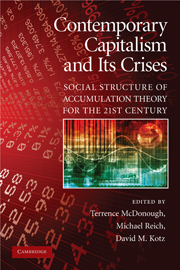Book contents
- Frontmatter
- Contents
- List of Tables
- List of Figures
- List of Contributors
- Acknowledgments
- Introduction: Social Structure of Accumulation Theory for the 21st Century
- PART I THE THEORY OF SOCIAL STRUCTURES OF ACCUMULATION
- PART II GLOBALIZATION AND THE CONTEMPORARY SOCIAL STRUCTURE OF ACCUMULATION
- PART III THE CONTEMPORARY SOCIAL STRUCTURE OF ACCUMULATION IN THE UNITED STATES
- PART IV SOCIAL STRUCTURE OF ACCUMULATION THEORY AND TRANSFORMATIONS OF THE CAPITALIST PERIPHERY
- 11 The Social Structure of Accumulation in South Africa
- 12 Social Structures of Accumulation and the Condition of the Working Class in Mexico
- 13 Social Structure of Accumulation Theory for the Arab World: The Economies of Egypt, Jordan, and Kuwait in the Regional System
- Index
- References
11 - The Social Structure of Accumulation in South Africa
Published online by Cambridge University Press: 05 June 2012
- Frontmatter
- Contents
- List of Tables
- List of Figures
- List of Contributors
- Acknowledgments
- Introduction: Social Structure of Accumulation Theory for the 21st Century
- PART I THE THEORY OF SOCIAL STRUCTURES OF ACCUMULATION
- PART II GLOBALIZATION AND THE CONTEMPORARY SOCIAL STRUCTURE OF ACCUMULATION
- PART III THE CONTEMPORARY SOCIAL STRUCTURE OF ACCUMULATION IN THE UNITED STATES
- PART IV SOCIAL STRUCTURE OF ACCUMULATION THEORY AND TRANSFORMATIONS OF THE CAPITALIST PERIPHERY
- 11 The Social Structure of Accumulation in South Africa
- 12 Social Structures of Accumulation and the Condition of the Working Class in Mexico
- 13 Social Structure of Accumulation Theory for the Arab World: The Economies of Egypt, Jordan, and Kuwait in the Regional System
- Index
- References
Summary
The social structure of accumulation (SSA) framework has been used to explain the dynamics of the South African economy under apartheid. Specifically, SSA analysis provides an explanation of why, after decades of rapid capital accumulation following the establishment of the apartheid state in 1948, the South African economy entered a period of economic crisis, beginning in the mid-1970s (e.g., Gelb 1987). The SSA approach offers an alternative to liberal explanations of the crisis years, which see apartheid and capitalism as antagonistic systems, and to traditional Marxist analysis, which argues that apartheid and capitalism were mutually reinforcing. However, the SSA approach, as it has been applied to South Africa, has been criticized for a lack of empirical rigor and a tendency toward functionalist arguments (Nattrass 1994). This chapter reexamines this critique and offers an empirical foundation for the SSA framework as it has been applied to apartheid South Africa.
If SSA analysis is relevant for understanding apartheid capitalism, can the same approach be applied to the economic transition in post-apartheid South Africa? Electoral democracy helped restore social stability after years of unrest, but, at the time of transition, the widespread deprivation that was the legacy of apartheid remained. This created a conundrum for capital: political stability needed to be restored, but doing so could unleash redistributive pressures unfavorable to business interests.
- Type
- Chapter
- Information
- Contemporary Capitalism and its CrisesSocial Structure of Accumulation Theory for the 21st Century, pp. 267 - 285Publisher: Cambridge University PressPrint publication year: 2010
References
- 3
- Cited by



